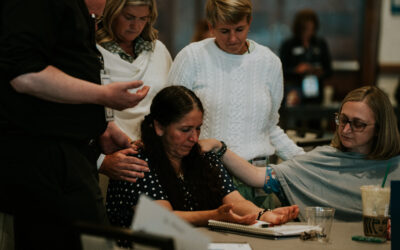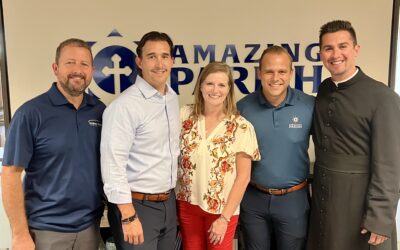[vc_row][vc_column][vc_column_text]
Strategy Takes Courage
One of the biggest differences between leading a parish during the age of Christendom vs. Apostolic Mission is strategy. In the old days of Christendom, parishes were largely the same, operating like franchises providing the same menu of services to people in their neighborhood. What was most important, it seemed, was providing all of the standard offerings of a parish. Not providing something that the parish in the next neighborhood provided could be a point of embarrassment in the deanery or diocese.
Frankly, that was never a good approach, as it inadvertently made parishes seem somewhat generic and often mediocre. As Christendom has faded and society has become more and more agnostic – and in some cases and places downright hostile to Jesus – a new approach to how we see our parishes is necessary. But it is difficult for many pastors, parish leaders, and even pew-sitting Catholics to embrace. Let’s call that approach Strategic Differentiation.
What I mean is that every parish needs to boldly become exactly what the people around them need in order to know and love God. Outside of the Mass and the Sacraments themselves – which are preeminent, of course – parishes need to see themselves as entrepreneurial restaurants, if you will, rather than generic franchises. They need to design their menus and their offerings specifically to maximize the impact they can have on their little part of the world, rather than on a singular, common, and generic model. Why is this so difficult?
Because it requires courage – the courage to disappoint some people who are locked into the Christendom model and don’t yet understand the shift toward apostolic mission. These people are so often seen as the heart of our parishes, when in reality they may be the anchors that keep our ships from moving forward. It’s not that they need to be rejected or cast aside, but rather taught to become missionaries rather than customers.
I recently worked with a parish that has gone through a significant shift in the past five years. Because of Covid, demographic changes, tired leadership, and macro-cultural changes, they are left with barely more than one third of their previous congregation. The staff is determined to revitalize the parish, but their first inclination was to do so by reinvesting in all the ministries they were doing five years ago. That is a common response to challenges within parishes – go back and make it like it was before. But the times have changed, society has changed, and the way the Church brings Jesus to the world has to change, too. Frankly, we, as a Church, needed to do this thirty years ago, but sometimes we don’t embrace change until our situation is so dire that we are forced to.
The new pastor of the parish, and his team, are going to change the way they go about revitalization in profound ways. The first step is pruning. Aggressively, but respectfully, putting an end to ministries that were not bearing fruit, is a requirement. With a limited staff and limited budget – which is the reality for 99% of the organizations in the world – it has to stop spreading its time, energy, and money across everything it had been doing for decades. That sounds logical, but when it comes to actually making those decisions, it is always harder than it seems. Too often, we pick one or two fledgling ministries to end, which doesn’t really address the problem in a meaningful way.
For this particular parish, they may need to stop doing Confirmation altogether for young people. Wait a second. Confirmation is a Sacrament. How can they stop doing it? Well, they have less than 10 young people going through confirmation, and yet they have a staff member that spends A LOT of time doing that. There are two parishes near them that have vibrant Confirmation programs. And get this. One of them is now their “sister parish,” run by the same pastor that is now overseeing theirs! It makes perfect sense to have those handful of students take part in a program nearby – it’s very close – leveraging the resources and programs and fellowship in that program. It seems like a no-brainer, right? But it’s hard, because the wonderful person who runs Confirmation at the declining parish might very well feel a deep sense of loss. And in the old world where every parish was generic, that was the unfortunate reality.
Of course, the better way to look at this is to ask that person, “What else could you be doing to bring people in this parish to Jesus if you weren’t doing Confirmation? How could we use your time, energy, and salary in a way that produces real fruit?” And in the vast majority of situations, there are plenty of opportunities. Even if there aren’t, that is not a good reason to continue spending money on programs and salaries that don’t bear fruit. After all, parishes are not jobs programs, but rather outposts of the Great Commission.
In the case of this particular parish, they are going to embrace their unique charism and situation. They are located in a commercial area – not an urban one. They are surrounded by businesses and freeways and traffic and commuters. Unlike almost all of the parishes surrounding them, relatively few of their parishioners live in nearby neighborhoods. And yet, they were trying to be like those neighboring parishes.
When the new pastor and leadership team looked at their unique challenges and strengths, they realized that they had a vibrant daily Mass program. Plenty of people who don’t go to that parish on the weekends attend daily Mass there. So, they are going to add an evening Mass every day to their already existing morning and noon Masses. They’re going to embrace being that parish of the town and cooperating with the surrounding parishes who have different opportunities and challenges.
Of course, that will mean they might not recapture some of their weekend attendees who have moved on to parishes closer to their homes in the suburbs, but bringing them back is not easy or likely. And more importantly, stealing parishioners from a neighboring parish is completely contrary to the idea of being an outpost of the Great Commission. That was the approach of many parishes during Christendom, which largely explains why we are in the position we are today.
To bring Jesus and His Church to a people who is increasingly lost and desperate for His grace and truth, we need to be bold, courageous, and strategic. We need to take risks. And for those who understandably ask, “But what about the collections and the financial stability of that declining parish?”, the answer is clear. God will provide. He always has. His mission has never been about lining up all the financial resources and risk-free plans before embarking on our mission.
For those who want more concrete assurance, I would say that the parish needs to go to the surrounding parishes and ask for their help. Explain that you are going to be sending some people to their parishes for ministries that they are more capable of providing, but they want to help those parishes by serving their parishioners who work in their area. They can cooperate by having priests cover some of the daily Masses that they are adding and by inviting their parishioners to use their Adoration Chapel (the only one in the area!).
I suppose the real approach for this parish, and for every parish in the age of Apostolic Mission, is to be part of the larger Church first. For faithful pastors and their teams, this requires looking out toward the world and strategically providing what it needs, rather than inward at the rectory or the parking lot, and carefully protecting what we have. As obvious as this sounds, and as undeniable as the current situation is, it is only with great courage and trust in God that we will be able to make the change.

Pat Lencioni | Co-founder
Amazing Parish
[/vc_column_text][/vc_column][/vc_row]




0 Comments